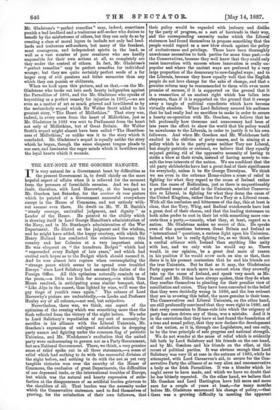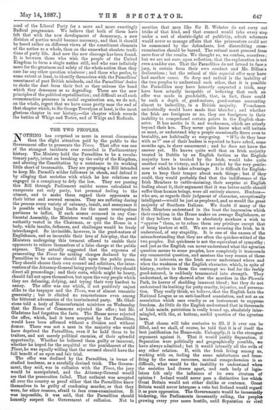THE KEY-NOTE AT THE al/SCHEN BANQUET.
IT is very natural for a Government beset by difficulties as the present Government is, to dwell chiefly on the more hopeful aspect of affairs when it is relieved for the moment from the pressure of formidable enemies. And we find no fault, therefore, with Lord Harrowby, at the banquet to Mr. Goschen last Saturday, for the couleur de rose picture which he painted of a Government successful everywhere except in the House of Commons, and not entirely with- out success even there. He dwelt on Mr. W. H. Smith's "steady courage, unrivalled judgment, and dignity" as Leader of the House. He pointed to the ability which is showing itself in Lord George Hamilton's administration of the Navy, and in Mr. Stanhope 's administration of the War Department. He dilated on the judgment and the wisdom, and he might have added, the happy courtesy, with which Sir Henry Holland has conducted the relations between this country and her Colonies at a very important crisis. He was eloquent on " the humdrum Budget" which had " superseded every Budget of late years," and which had excited such hopes as to the Budget which should succeed it. And he rose almost into rapture when contemplating the "strange peace which seems to be spread over troubled Europe " since Lord Salisbury had assumed the duties of the Foreign Office. All this optimism naturally reminds us of the poem,—a little too Irish for accuracy,—in which Tom Moore resolved, in anticipating some similar banquet, that, "Like Alps in the sunset, thus lighted by wine, we'll wear the gay tinge of youth's roses again." The colours of Lord Harrowby's picture are undoubtedly,—as Locke and Professor Huxley say of all colours,—not real, but subjective.
Nevertheless, there was, we think, one aspect of the optimism of the evening which was something more than the flush reflected from the victory of the night before. We refer to Lord Salisbury's repudiation of any sort of necessity for sacrifice in his alliance with the Liberal Unionists, Mr. Goschen's expression of unfeigned satisfaction in dropping party names and fighting under the common flag of patriotic Unionism, and Mr. Wodehouse's exultation that the united party were endeavouring to govern not as a Party Government, but as a National Government. There, we think, a very genuine sense of relief spoke out in all three stateemen,—a sense of relief which had nothing to do with the successful division of the night before, and nothing to do with the not as yet very tangible victories won over the anarchy of the House of Commons, the confusion of great Departments, the difficulties of our depressed trade, or the international troubles of Europe, but which was the natural and hearty expression of satis- faction at the disappearance of an artificial burden grievous to the shoulders of all. That burden was the necessity under which the Conservative statesmen used to find themselves of proving, for the satisfaction of their own followers, that
their policy would be regarded with jealousy and dislike by the party of progress, as a sort of barricade in their way, and the corresponding necessity under which the Liberal statesmen had found themselves to propose something that the people would regard as a new blow struck against the policy of exclusiveness and privilege. These have been thoroughly unwelcome necessities to both parties for some time past,—to the Conservatives, because they well knew that they could only resist innovation with success where innovation is really un- popular and where the ancient ways are preferred by a very large proportion of the democracy to new-fangled ways ; and to the Liberals, because they knew equally well that the English people do not love change for the sake of change, and that a genuine reform may be recommended to them with even more promise of success, if it is supported on the ground that it is a reassertion of an ancient right which has fallen into abeyance, than if it is supported on the ground that it sweeps away a tangle of political expedients which have become virtually obsolete. When Lord Salisbury assured his audience that he had really had no sacrifices to make in order to secure a hearty co-operation with Mr. Goschen, we believe that he felt profoundly' ow tiresome and unnecessary had been of late years the effort to show the world that his policy would be unwelcome to the Liberals, in order to justify it to his own followers. And when Mr. Goschen and Mr. Wodehouse both exulted in the oblivion of party names, and in aiming at a policy which is in the party sense neither Tory nor Liberal, but simply patriotic or national, we believe that they equally enjoyed getting rid of the oppressive necessity of having to strike a blow at their rivals, instead of having merely to con- sult the true interests of the nation. We are confident that the old party shibboleths have lost a great deal of their significance for everybody, unless it be Sir George Trevelyan. We think we see even in the extreme Home-rulers a sense of relief in fighting for what they regard as the cause of Ireland rather than the cause of Radicalism, just as there is unquestionably a profound sense of relief in the Unionists, whether Conserva- tive or Liberal, in fighting for what they deem the cause of the United Kingdom, rather than for a Tory or a Liberal cause. With all the confusion and bitterness of the day, this at least is clear, that the Tory, Whig, and Radical watchwords have lost a great deal of their charm, and that the leading statesmen on both sides prefer to cast in their lot with something more con- crete than a party,—namely, what they, at least, regard as a nation. Mr. Gladstone makes no secret of this. He speaks even of the questions between Great Britain and Ireland as " international " questions, a curious light upon his Unionism. Indeed, what he is really fighting for, as we think, is rather a cordial alliance with Ireland than anything like unity with her, and we only wish he would say so. There would, in our opinion, be a great deal more of reason in his position if he would avow such an aim as that, than there is in his present contention that he and his friends are the true Unionists. But be that as it may, the Gladetonian Party appear to us much more in earnest when they avowedly take up the cause of Ireland, and speak very much as Mr. Parnell and Mr. Dillon have always spoken, than they do when they confine themselves to pleading for their peculiar view of conciliation and union. They have been converted to the belief that they were decidedly wrong in 1880, and the less reticent they are in avowing this belief, the more genuine is their tone. The Conservatives and Liberal Unionists, on the other hand, are still profoundly convinced that they were right in 1880, and that every concession to Home-role into which the exigency of party has since driven any of them, was a mistake. And it is in the conviction that they have at last found the foundation of a true and sound policy, that they now declare the development of the nation, as it is, through one Legislature, and one only, to be the true principle of safe progress and national strength.
We do not wonder at the sense of relief which is evidently felt both by Lord Salisbury and his friends on the one hand, and by Mr. Gaechen and his friends on the other, at this recast of political parties. It was obvious enough that Lord Salisbury was very ill at ease in the autumn of 1885, while he attempted, with Lord Carnarvon's aid, to secure for the Con- servative Party the alliance of so very alien and unconservative a body as the Irish Parnellites. It was a blunder which he ought never to have made, and which we have no doubt that he has bitterly repented. On the other hand, we believe that Mr. Goschen and Lord Hartington have felt more and more sure for a couple of years at least,—for many months before Mr. Gladstone announced his change of policy,—that there was a growing difficulty in meeting the apparent need of the Liberal Party for a more and more exactingly Radical programme. We believe that both of them have felt that with the new development of democracy, a new division of parties would become necessary, and that it should be based rather on different views of the constituent elements of the nation as a whole, than on the somewhat obsolete tradi- tions of party life. And now the new cleavage has been found. It is between those who wish the people of the United Kingdom to form a single nation still, and who care infinitely more for the greatness and safety of the whole nation than they care for any other question whatever ; and those who prefer, to some extent at least, to identify themselves with the Pamellitee resentment of past British misdeeds, and the Parnellites' desire to shake the dust from their feet as they unloose the bond which they denounce as so degrading. These are the new principles of the political crystallisation; and difficult as all such reconstructive processes in social organisation are, we do not, on the whole, regret that we have come pretty near the end of that chapter which, to Sir George Trevelyan at least, is the most glorious chapter in our history,—the chapter which records the battles of Whigs and Tories, and of Whigs and Radicals.



































 Previous page
Previous page